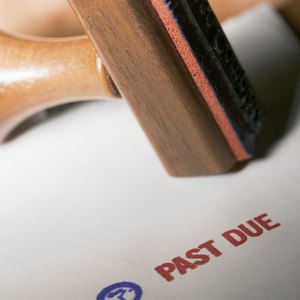
You know you're supposed to pay your bills on time. However, sometimes circumstances get in the way, and you're unable to make a payment until after the due date passes. How severe the penalty is for lateness depends on what type of bill is past due.
Credit Card Bills
Technically, you can pay your credit card as late as six months past its due date before the payment gets written off by the credit card company as uncollectible. Waiting this long, though, has serious long-term ramifications for your credit score. The longer you wait, the more your credit is negatively affected. You'll also have to deal with late fees, which kick in the day after your due date.
Car Bills
Moving into secured debt, such as automobiles, means there's far more at risk than just your credit score. Failure to make payments on a car loan could mean losing the car in a repossession. This can happen if you're even one day late on a car payment, so be sure to contact your lender if you're having financial difficulty. Late fees also apply to car loans, although there is normally a 10-day grace period during which you can make a payment without penalty.
Mortgage Bills
Mortgage payments are similar to car payments; if you don't make regular payments in full, there's a chance you could lose your home. As is the case with car loans, you have a grace period before a late fee is assessed. However, waiting beyond this grace period to make payments lets your bank know you're at risk of not making the payment, which may encourage it to begin the process of foreclosing on your home.
Utility Bills
Cell phone bills, cable bills, light bills and heating/air conditioning bills aren't secured in the way house and car notes are, but they may as well be. If you don't make payments, you lose that utility. In most cases, you won't face a shut-off right away, but if you fall a month behind, you're at risk for disconnection. You're also subject to late fees and collection calls if you pay late. If you think you're going to have trouble making your payment, contact the provider right away so that you can make an arrangement.
References
- MyFICO: What Are the Different Categories of Late Payments and How Does Your FICO Score Consider Late Payments?
- Edmunds: Stay One Step Ahead of the Repo Man
- LA Times: Dealing With Mortgage Company's Calls During Payment Grace Period
- Michigan State Housing Development Authority: Stages of Foreclosure
- Consumer Financial Protection Bureau (CFPB). "How Long Does Negative Information Remain on My Credit Report?" Accessed Dec. 10, 2019.
- Equifax. "When Does a Late Credit Card Payment Show Up on Credit Reports?" Accessed Dec. 10, 2019.
- Consumer Financial Protection Bureau (CFPB). "Does My History of Paying Utility Bills, Like Telephone, Cable, Electricity, or Water, Go in My Credit Report?" Accessed Dec. 10, 2019.
- Consumer Financial Protection Bureau (CFPB). "The Card Issuer Increased My Interest Rate on My Existing Balance. Can They Do That?" Accessed Dec. 10, 2019.
- Capital One. "Credit Card Charge-Off." Accessed Dec. 10, 2019.
- MyFICO. "Payment History." Accessed Dec. 10, 2019.
- Federal Trade Commission Consumer Information. "Disputing Credit Card Charges." Accessed Dec. 10, 2019.
Writer Bio
Bryan Berg is a freelance writer based in Long Island, NY. He has been writing since 2002 about personal finance, sports and parenting. He is a contributing writer to eHow Money and LIVESTRONG.COM. He has a Bachelor of Arts in marketing from Hofstra University.

